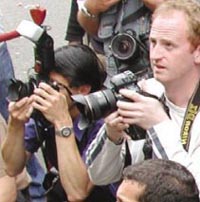Russians trust only Putin and mass media
Political activity in today’s Russia is mostly shaped by high confidence the Russians have in the mass media. The stand of the media has as mush influence on the public opinion and attitudes as does the reality itself. The media largely supersedes or acts as a substitute for other institutions of a civil society e.g. political parties, trade unions, societies. The electronic media provides a real unity of culture and information area of the Russians by uniting them in a virtual political nation.

Public opinion polls conducted by VTSIOM (All-Russian institute of public opinion studies) in 2005-2006, show that despite showing a fairly large amount of skepticism toward the majority of governmental institutions, the people in Russia choose the Russian president and media as the most trustworthy institutions of society. President Putin’s approval ratings remain in a range of 72-77% this year while the media on the whole as an institution of society has is a steady runner-up with 53-55%. The heads of the subjects of the federation with the aggregate ratings of 42-52% sit next to the runner-up. The following institutions follow: local authorities (36-42%), the government (32-34%), and both houses of the Federal Assembly (slightly above 20%). Political parties and trade unions have much lower confidence ratings, 17-19% and 12-14%, respectively. Unlike political parties and trade unions, the media (above all, the electronic ones) have become the most important mechanism that unites society. The media is a driving belt connecting society and the powers-that-be. However, the connection is apparently is a one-way variety.
It is quite noteworthy that the media’s confidence ratings correlates in the closest way with the approval ratings applied to President Putin and political regime associated with President Putin. 61.8 % of those who approve the media also approve the activity of President Putin. Only 28.4% of President Putin’s opponents approve the media. Members of Russia’s new middle class supporting the current authorities are the major consumer of the media. The new middle class comprises people who have adjusted to new economic and social realities. That new class is oriented on informative that is rather positive and optimistic. It prefers entertainment to quality analytical features, it opts for modern pop music and skips traditional and nonconformist music shows. Today’s media fully meets the requirements.
Modern TV is practically the only existing network capable of uniting Russia’s residents scattered across the vast territories. The residents that poles apart in terms of social status.
Their economic and social lifestyles differ greatly. Back in the 1990s, something akin to “political clubs” stemmed from the differences between the information policies of the TV stations. It is simply impossible to detect any of such changes in today’s TV. All strata of the Russian society consume the same TV “meals” prepared using similar information technologies.
Not unlike other means of the media, TV largely supersedes political parties because a majority of the people do not give a damn about political mechanisms, membership and rallies. The viewpoint of the electronic media shapes public support and public opinion. The present-day authorities adequately realized the power of TV. The authorities largely hold sway over public trends as they control the leading media.
But what comes first here? Do Russians support the current regime because of their positive assessment of its real achievements? Does their support have move to do with predominantly electronic media painting a fine portrait of the regime? On the other hand, do the people okay the work of the media today because the assessment is part of overall improvement of the socioeconomic situation in Russia? It is difficult to pinpoint the original reason. More importantly, the media looks quite uniformed in terms of culture, and the uniformed media mostly corresponds to a larger part of society as regards its cultural unity.
Vremya Novostei
Translated by Guerman Grachev
Pravda.Ru
Subscribe to Pravda.Ru Telegram channel, Facebook, RSS!




